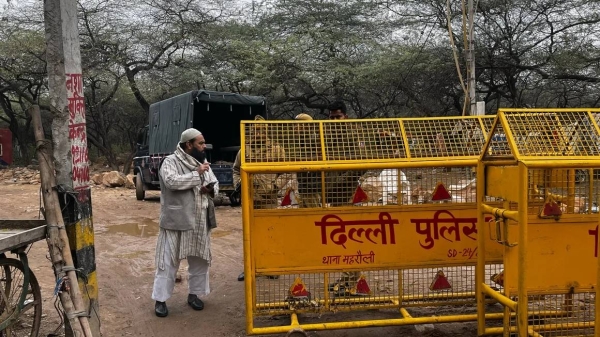
Do you remember the young Iraqi man who, 10 years ago, threw a shoe at US President George W. Bush? He has become a member of the Iraqi Parliament, following the elections a few days ago.
His name is Muntadhar Al-Zaidi. He is an Iraqi journalist who gained notoriety when he showed his displeasure with Bush and the war in Iraq during the American president’s press conference with Iraqi Prime Minister Nuri Al-Maliki. He was jailed for a while but then released to embark on a journey of fame in the Arab world, and beyond, all thanks to his shoe. Some wealthy Arabs even offered huge sums of money to buy it.
It is not an exaggeration to say that Al-Zaidi is now in Parliament because of that shoe and what he did with it a decade ago. The fact that Iraqi voters believe that he restored their dignity through the famous incident is just one of the realities of our country. However, this reality is challenged by another fact. Two years ago, journalist Mariam Yaghi, Al-Zaidi’s Lebanese former wife, posted photos of her bloodied face on Facebook page and said the injuries happened when Al-Zaidi, the celebrated Iraqi hero, hit her.
Anyone who has seen Al-Zaidi’s Facebook posts cannot fail to notice his aggressive and masculine attitudes toward women. He is currently engaged in the Lebanese religious courts in a legal battle with his wife for custody of their children. Bear in mind that these laws are often unfair to women and marital violence is not considered sufficient grounds for divorce.
Still, surely Iraqi voters were persuaded to back Al-Zaidi because of his famous shoe, and not the fact that he is a person who dislikes women and hits his wife.
Actually, the elections tell us a lot about the conditions faced by women in Iraq, and contain some revelations about their position in society. This is despite the fact that the country’s electoral law is considered among the most advanced among Arab countries. It imposes a 25 percent quota on the number of seats to be held by women in the lower house of Parliament, something that is lacking in Lebanon, for example, which is a more liberal country.
Before the election, an Iraqi female candidate hung a photograph of herself, wearing a headscarf, in an area of the Central Euphrates region. A video of a young man climbing up and kissing the picture circulated on the Internet. The perpetrator was identified and, as a result, his tribe had to visit the candidate’s tribe and an amount of 100 million Iraqi dinars ($84,000) was offered for forgiveness and as a token of apology for the man’s behavior.
Muntadhar Al-Zaidi is not the only one representing a dark attitude toward women.
Diana Moukalled
The candidate’s tribe accepted the apology and exempted the visitors from paying the money. A video showing the young man’s tribe apologizing to the candidate’s tribe was made public, but the apology happened in the absence of the candidate because women are not allowed to be present at such events — even if they aspire to represent their regions and tribes in Parliament.
One of the wonders of the Iraqi election was the presence of candidates wearing headscarves representing the Iraqi Communist Party in Najaf. This is not intended to belittle either the headscarf or the political choices of the candidates, but the inherent contradiction of that situation was an indicator of the enormous pressure women were subjected to.
The Iraqi elections pushed them to the forefront of the political scene, but it left them vulnerable to things that are rejected by the social milieu. This shows the pressure that the veiled female candidates were under and indicates that the Iraqi Communist Party has been reformulated to fit the Iraqi norm.
Iraqi law has imposed a quota for women in the Parliament but they were besieged by religious groups and political and tribal divisions that attempted to undermine their status.
This is how we read the case of Al-Zaidi, whose Facebook page is full of comments that are contemptuous of women and demeaning to their status. As for the woman in Central Euphrates, she could not avoid hanging her photo because she was a candidate for the elections — for which she was subjected to acts of the kind committed by the young man, leading to a tribal dispute.
The idea of elections and equal opportunities do not reflect the constraints of society, which means women face multiple restrictions. In the new Iraqi Parliament there are representatives who embody the unjust situation faced by women, but there are also elected deputies who hold unjust and unfair convictions about women as part of their agenda.
“When a stupid woman reads about freedom, she takes off her clothes,” wrote Al-Zaidi in one of his Facebook comments. “And when a foolish woman reads about freedom, she ruins her home.”
However, Al-Zaidi is not the only one representing a dark attitude toward women. Iraqi religious parties were obliged to nominate women — they dominate the Parliament now and have brought with them Iraqi women who are similar to Al-Zaidi in their attitudes toward women and his perception of their status.
• Diana Moukalled is a veteran journalist with extensive experience in both traditional and new media. She is also a columnist and freelance documentary producer.
Twitter: @dianamoukalled












